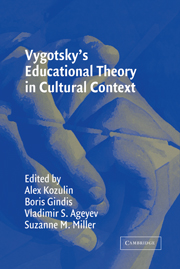Book contents
- Frontmatter
- Contents
- List of Contributors
- Series Foreword
- Introduction: Sociocultural Theory and Education: Students, Teachers, and Knowledge
- PART I CONCEPTS AND PARADIGMS
- PART II DEVELOPMENT AND LEARNING
- PART III SOCIOCULTURAL THEORY APPLICATION IN THE CLASSROOM
- PART IV DIVERSE LEARNERS AND CONTEXTS OF EDUCATION
- 16 Intrapersonal Communication and Internalization in the Second Language Classroom
- 17 Mediation in Cognitive Socialization
- 18 Cultural Modeling
- 19 The Relations of Learning and Student Social Class
- 20 Vygotsky in the Mirror of Cultural Interpretations
- Author Index
- Subject Index
- Titles in the series
- References
17 - Mediation in Cognitive Socialization
The Influence of Socioeconomic Status
Published online by Cambridge University Press: 05 June 2012
- Frontmatter
- Contents
- List of Contributors
- Series Foreword
- Introduction: Sociocultural Theory and Education: Students, Teachers, and Knowledge
- PART I CONCEPTS AND PARADIGMS
- PART II DEVELOPMENT AND LEARNING
- PART III SOCIOCULTURAL THEORY APPLICATION IN THE CLASSROOM
- PART IV DIVERSE LEARNERS AND CONTEXTS OF EDUCATION
- 16 Intrapersonal Communication and Internalization in the Second Language Classroom
- 17 Mediation in Cognitive Socialization
- 18 Cultural Modeling
- 19 The Relations of Learning and Student Social Class
- 20 Vygotsky in the Mirror of Cultural Interpretations
- Author Index
- Subject Index
- Titles in the series
- References
Summary
Social activities and adult–child interactions form the basis for cognitive socialization. The extent to which everyday activities differ by socioeconomic status (SES), and the extent to which they are employed differently, becomes a contentious topic when different outcomes in social and academic competence are linked. Socialization results in attitudes, values, and cognitive and linguistic skills that children use as they grow and ultimately become means or tools for development. Children develop competencies through various patterns of adult–child and other social interactions. Often what is seen as important and valuable for socialization varies across communities. Only some of the literature on adult–child interaction addresses elements of SES differentiated activity settings – for example, family structures, scripts, values, and task demands – that are historically embedded. This chapter focuses on a cultural–historical analysis of research linking SES to variations in adult–child interaction.
Although the scope of the chapter limits the extent to which these topics may be explored, a sample of research is examined and framed within the structure provided by Cultural–Historical Activity Theory (CHAT), along with examples of adult–child interaction research approached from a CHAT perspective. CHAT is characterized by a developmental and social analysis of human action that is mediated generally by different cultural tools. To understand differences in individual development, variations in the latter must be considered across activity settings, as well as the way a person responds in terms of shared values, expectations, and practices.
- Type
- Chapter
- Information
- Vygotsky's Educational Theory in Cultural Context , pp. 371 - 392Publisher: Cambridge University PressPrint publication year: 2003
References
- 10
- Cited by



